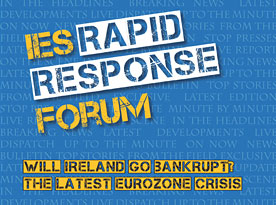Will Ireland go bankrupt? Economic historian sheds light on latest eurozone crisis
UC Berkeley economic historian Barry Eichengreen, an expert on the international monetary and financial system, discussed the Irish economic crisis at a campus seminar Nov. 17. He said Ireland needs to restructure much of the bank debt that its government has effectively taken onto its balance sheet — debt that could reach a staggering 130 percent of GDP in the coming year.
November 22, 2010
UC Berkeley economic historian and economist Barry Eichengreen, an expert on the international monetary and financial system, walked a special seminar group, assembled on campus Friday (Nov. 19), through what led to Ireland’s financial crisis and possible solutions and pitfalls.

Economic historian Barry Eichengreen
Ireland has grabbed headlines as Irish and European Union (EU) authorities have wrestled with what to do about the staggering government debt — primarily needed to cover a wounded banking system that the Irish government has pledged to keep alive. That debt, Eichengreen estimated, could reach 130 percent of the country’s Gross Domestic Product in the coming year.
The debate about how Ireland, the EU, and the International Monetary Fund (IMF) might cooperate in a multi-year plan to prevent financial collapse in the Emerald Isle follows a financial bailout of Greece six months ago, and before forecasts now in the making of what may turn out to be a similarly dire situation in Portugal.
Ireland is just slightly larger than the state of North Carolina, but its financial collapse could trigger financial flight from Portugal and Spain, Eichengreen warned, with ripples felt widely.
Eichengreen’s briefing was part of a new “rapid response” series sponsored by the Institute of European Studies. A December briefing is planned on new austerity measures being implemented by the British government. More details will be available on the IES website.
In Eichengreen’s talk, “Will Ireland Go Bankrupt?” he noted that Ireland experienced an even larger housing boom and bubble than the United States in the years leading up to its crisis. When the bubble burst, it took with it much needed tax revenues and public confidence in the ability of Ireland’s financial institutions to rebound, he said.
And Ireland can’t work its way out of its bind simply with more government cutbacks, having already slashed public spending by 3 percent of the country’s GDP this year to achieve a “pretty lean and mean government,” according to Eichengreen. Nor can the problem be solved by simply stretching out the adjustment — having the EU and IMF lend the country enough money to keep it financially afloat for the next two or three years, he suggested. This approach hasn’t worked in Greece, he observed, and making Ireland “Greece 2.0” would be no more effective.
What Ireland needs, Eichengreen said, is to restructure much of the bank debt that the government has effectively taken onto its balance sheet. In addition to an infusion of cash, which can be used to recapitalize the banks and keep basic public services going, it can launch an exchange offer in which the creditors are offered a menu of bonds valued at a fraction of previous bonds. A similar scheme, the Brady Plan, worked in Latin America in the 1980s and could help Ireland too.

“Will Ireland Go Bankrupt?” was part of a new “rapid response” series sponsored by the Institute of European Studies.
Ireland also is being pressured to raise its low corporate tax rates, which have lured multinational corporations to do business in the country. But Eichengreen said taking such a step today would compound the disaster for the country of 4.6 million — by driving away the same corporations attracted previously. Eichengreen also suggested that French and German critics of Irish tax policy have a point, since multinational corporations engaging in “tax arbitrage” transfer profits to Ireland in order to evade higher taxes abroad. Ireland could pledge to raise the rates at a later date, he said.
One possible stumbling block to Ireland’s accepting aid from others, he said, include a fierce national pride and approaching centenary of the Easter Rising of 1916 that gave birth to the Irish republic and broke with Great Britain.
Looking further down the road, Eichengreen suggested that Europe will have to complement its monetary union with a limited fiscal union. It will need a more limited version of the fiscal transfers among the 50 U.S. states that occur through the federal tax and transfer system. But as memories of World War II fade, there is a real question, Eichengreen said, of whether or not the impulse to share national sovereignty and deepen the process of European integration will be felt as powerfully as before.
Eichengreen is the author of numerous books. His latest is “Exorbitant Privilege: The Rise and Fall of the Dollar and the Future of the International Monetary System,” due out in January 2011.